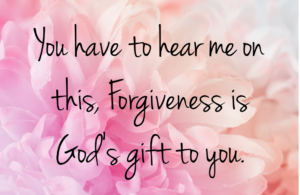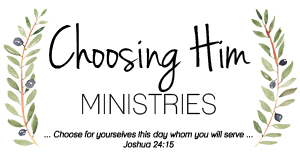
What makes forgiveness such a hard choice? Why do so many of us struggle with offering forgiveness? Choosing to forgive in this world often seems like we are validating the act; that in some way, we are saying what happened is okay. Forgiveness can be seen as a sign of weakness or a sign of acceptance. The world says we should seek revenge because we were wronged. The world says we did not deserve what happened, and someone has to pay. These observations and definitions are the world’s standards. So often forgiveness in this world is conditional. We think, I’ll forgive as long as you don’t hurt me again. However, as soon as a new offense is committed, we mix everything into the same pile again and the forgiveness extended is taken back. Our view of forgiveness is clouded by our selfishness.
This is not the forgiveness God asks us to choose. The forgiveness God offers and He asks us to choose, frees us. The Greek word aphiemi means to “leave, pardon, remit, cancel, repented or abandon.” Forgiveness allows us to put the baggage down and to look forward to the blessings that God promises He will make out of our rubble. God’s entire purpose of sending His one and only Son was to forgive. God knew the only way to reconcile relationships, primarily ours with Him is to place forgiveness at the foundation.
- What does true forgiveness look like? True forgiveness is putting others before yourself. It’s allowing God to sit in His rightful seat and to be the standard and the judge. Forgiveness is looking past the action to see the person, learning to see them through God’s eyes. Forgiveness understands that the other person’s value does not rest in how we view them, but in how Christ views them. Christ gave His life so that we might find forgiveness from our sin. It is this forgiveness that gives each of us the opportunity to reconcile our own relationship with God. Christ died for everyone. Our value is only found in Him.
Corrie ten Boom, in her book, Reflections of God’s Glory1 wrote,
In Africa, a man came to a meeting with bandaged hands. I asked him how he had been injured. He said, “My neighbor’s straw roof was on fire; I helped him to put it out, and that’s ho
w my hands were burned.” Later I heard the whole story. The neighbor hated him and had set his roof on fire while his wife and children were asleep in the hut. They were in great danger. Fortunately, he was able to put out the fire in his house on time. But sparks flew over to the roof of the man who had set the house on fire, and his house started to burn. There was no hate in the heart of this Christian; there was love for his enemy, and he did everything he could to put out the fire in his neighbor’s house. That is how his own hands were burned.
- I encourage you to read, in your Bible, the stories of Joesph, Jonah and Hosea. These three people had to make a very difficult choice to forgive. They had every worldly reason to hold a grudge and to hate those who had wronged them. Some of them chose forgiveness, and we see the impact of that choice both in their lives and in the life of the person who received the gift. Others gave it and then took it back, and we will see the impact of that as well. Forgiveness is not deserved; it’s a gift.
- Forgiveness is a gift that we are given. We are expected to forgive others in return.
Let me remind you as we read through the stories of these people’s lives that, just like us, they lived one day and one choice at a time. Draw strength from seeing the end result of right choices being made. Your story can turn out just as incredible as others, living one day at a time and one choice at a time.
Clothe yourselves with tenderhearted mercy, kindness, humility, gentleness, and patience. Make allowance for each other’s faults, and forgive anyone who offends you. Remember, the Lord forgave you, so you must forgive others.
Colossians 3:12–13 nlt







